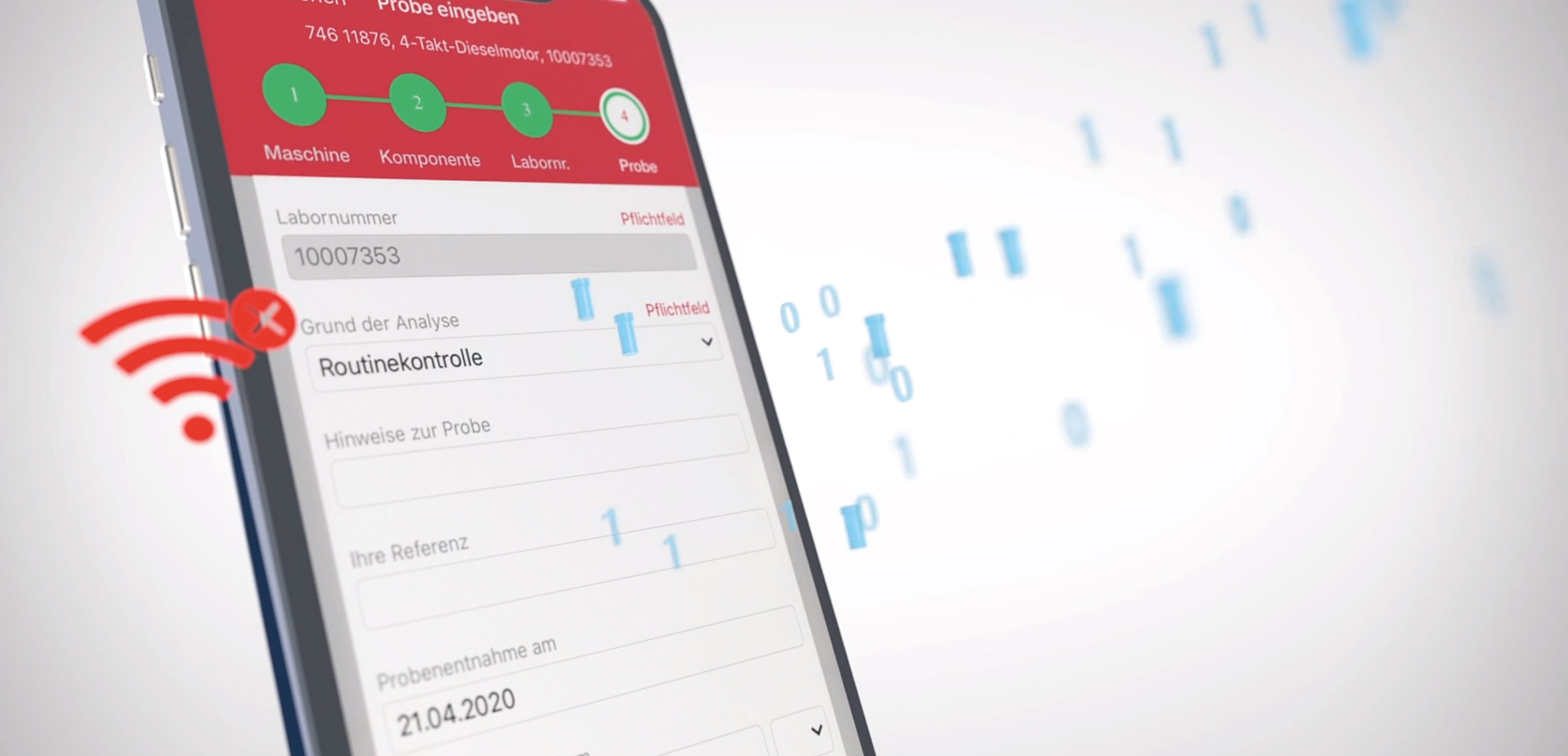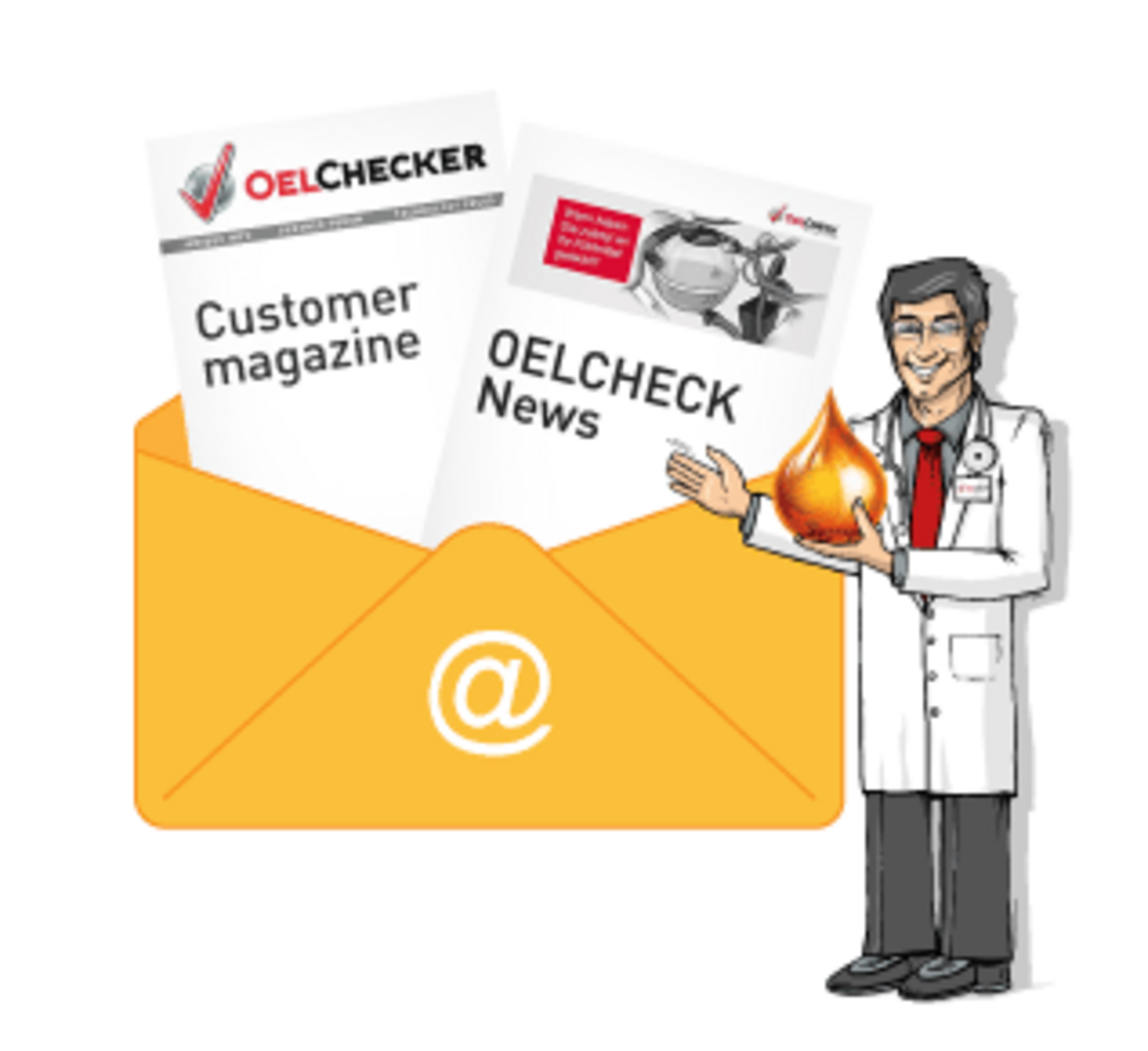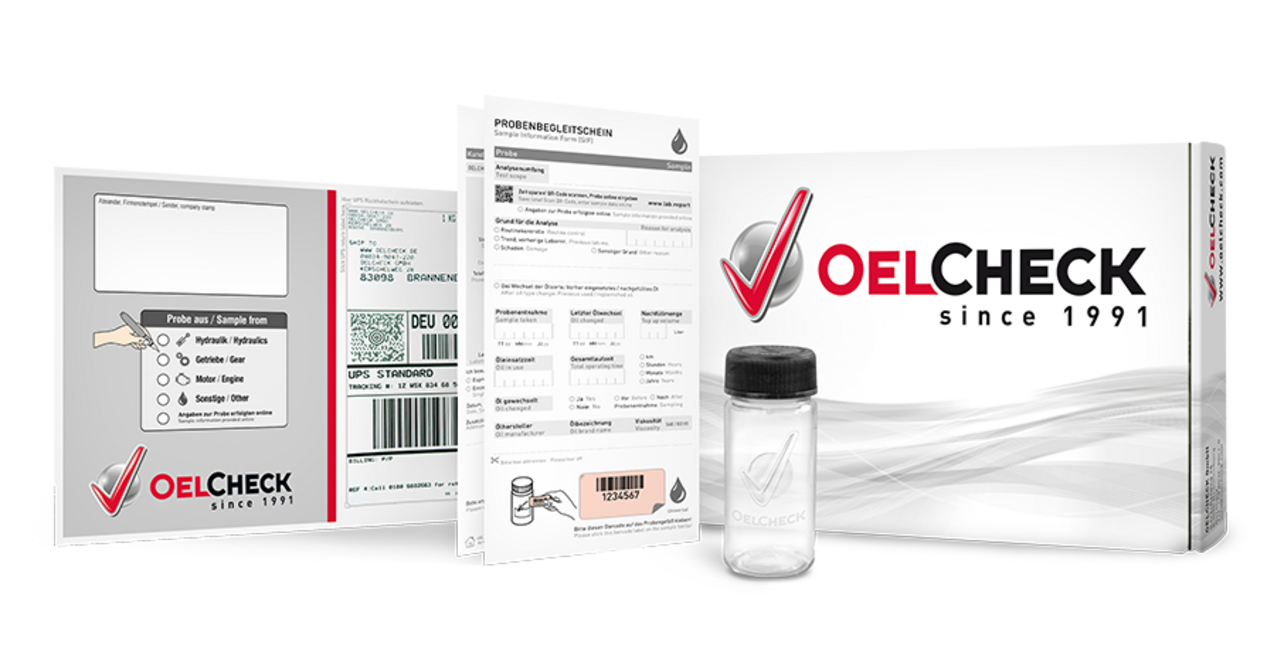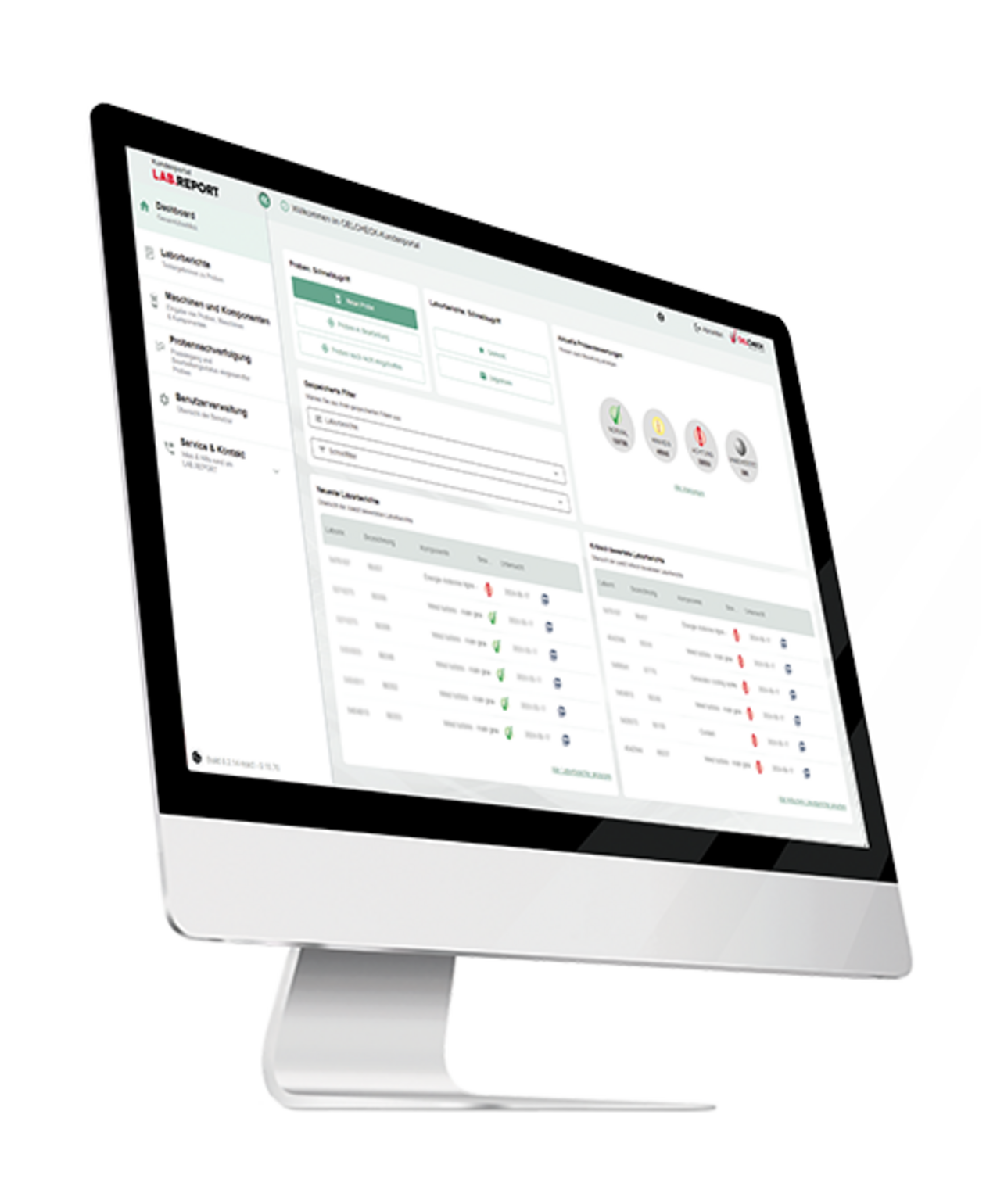Digitalisation and lubricant analysis – A perfect combination
Publication year: 2023
More and more knowledge is being stored digitally. We have stored the results of approx. 5 million tested lubricant and fuel samples in the large OELCHECK database alone and thus have access to approx. 190 million individual values. And more are being added all the time. Every day we receive, process and send an enormous amount of data. Digitalisation has been part of our workflow for some time already. This is the only way we can manage the flood of data and provide our customers with a host of smart service tools for data exchange, such as the OELCHECK app 4.0, the LAB.REPORT customer portal, FTP server or API interfaces.
Powerful IT systems do the rest. Various software systems prepare the analysis data for the OELCHECK tribologists and ultimately for the customers in order to make use of the flood of data, to make correlations clear and to be able to make statements. Our lubricant and service product analyses have contributed to the sustainable operation of companies for over 30 years by determining condition-dependent oil changes and evaluating trend analyses. But in the age of digitalisation, lubricant analytics can make an even more efficient contribution to maintenance and servicing.

Two-way data exchange
Collecting data is not difficult. But it’s not about collecting as much data as possible, but rather the relevant data. And this is where the human factor comes into play! OELCHECK supports customers with well-thought-out sample information forms in order to obtain truly meaningful information. They focus on the essential information, are optimally structured and ask industry-specific questions. In the customer’s own interest, these should be answered carefully and in full. The more relevant information the OELCHECK tribologists have available, the more detailed and meaningful their diagnoses can be.
Correct transmission of the information to the OELCHECK laboratory is essential. Electronic data transfer of the sample information forms via the OELCHECK APP 4.0 (with or without the use of QR codes) or the OELCHECK customer portal as well as a possible data import via an API interface offers many advantages:
- The key data concerning the lubricant and the machine are stored once and are then always available. Only the variable data of the current oil sample (e.g. oil service life) has to be added.
- This significantly reduces data entry errors.
- No more ambiguities and questions due to illegible handwriting.
- Mandatory input fields ensure that the customer submits all of the important information.
- Data can be checked for plausibility if, for example, an oil service life has been specified that is longer than the total life span of the machine.
- Automatic assignment of the data to the component or machine from which the sample originates.
- Electronic data transmission to the OELCHECK laboratory is simple, secure, fast and efficient.
After completing the examination of a sample in the laboratory, OELCHECK returns the laboratory report with its data to the customer. Again, there are various options available for this:
- By e-mail as a PDF file.
- By means of a data export in various formats via the OELCHECK customer portal.
- Saved on an FTP server for retrieval.
- Direct transfer to the customer system via an API interface.
If a customer only needs the laboratory reports of individual samples, they can still be sent in printed form by post or as a PDF file by e-mail. However, each laboratory report contains up to 40 individual values. A figure that quickly adds up in the case of multiple samples. The sending of a larger number of laboratory reports and, above all, the preparation of the data at the customer’s premises can only be achieved with digital support. Specially set-up options for data export or linking the customer’s IT systems with those of OELCHECK come into play.
With a data export, the analysis results can be transferred into the desired form and thus directly imported into the customer’s software and processed. The data can be exported to the OELCHECK LAB.REPORT web portal by the customer. Alternatively, OELCHECK can set up an automated export to the customer. This is done by providing the analytics data on an FTP server or transmitting it via an API interface.
FTP stands for “File Transfer Protocol”, a communication protocol that regulates the conditions under which different IT systems can communicate with each other. In this way, the analysis data from the OELCHECK laboratory is made available to the customer at a defined time, who can collect it and process it accordingly.

![[Translate to "English"] Header Digital [Translate to "English"] Header Digital](/fileadmin/user_upload/header-digital.jpg)
Even more elegant is the direct connection of the customer’s systems with those of the OELCHECK laboratory using a specially programmed API (Application Programming Interface). This makes it possible to exchange data in a standardised manner. The transfer of data and commands is structured according to a previously defined syntax. The customer can access all their data and analysis results at any time. In addition to current analysis data, analyses from the history can also be used, as the interface allows a permanent and continuous exchange of information.
- An API interface represents the optimal option for data transfer in both directions. The data from the complete OELCHECK analyses are automatically imported into the customer’s maintenance program. This means that they can derive the maximum benefit for the sustainable use of their lubricants and machines.
Big data used in a smart way by OELCHECK
Even in the age of digitalisation, the monitoring of lubricants and thus systems and machines is the central task of lubricant analytics. However, more is expected of lubricant analytics today than just the assessment of individual samples and related trends. In order to be able to handle increasingly diverse tasks, it needs the support of digitalisation. As part of a big data analysis, such as the type OELCHECK carries out, a large number of analysed samples are used to uncover hidden patterns, previously unknown correlations and other useful information for the customer.
Thanks to such queries, OELCHECK tribologists don't just have access to the parameters determined during the analyses. If a large number of laboratory reports are available for a customer, the analysis of these data sets opens up a much more comprehensive view of the available data material.
In the past, it was not feasible to be able to make a statement on some complex relationships. Nowadays, however, it is possible to carry out evaluations for customers when questions arise, such as:
- A customer has received lab reports with a red exclamation mark indicating an urgent need for action. What values were the reason for this? What can be deduced from this?
- Are the analysis values of a lubricant identical for several identical machines with different load profiles? If there are differences, where and why do they occur?
- A company operates its machinery at different locations or in numerous countries. Why do regional deviations in the analysis values occur with identical machines?
- How often did a customer have oil changes carried out, even though they were unnecessary?
- On which machines / how many machines has no oil change been carried out despite being ordered by the service manager?
Digitalisation and its possibilities are the perfect complement to lubricant analysis. IT not only allows the storage, processing and rapid transmission of large amounts of data, but also enables the linking of IT systems and thus the immediate implementation of analysis data in the maintenance programs of OELCHECK customers. In addition, digitalisation is essential for the OELCHECK laboratory information and management system (LIMS). With its wide range of programs, it supports and controls all procedures and processes as part of every investigation of a lubricant or fuel. But even though we use the possibilities of digitalisation in a smart way, it is only OELCHECK tribologists who can ultimately use their expertise to evaluate analysis results and answer far-reaching questions.

OELCHECKER Summer 2023, page 3




